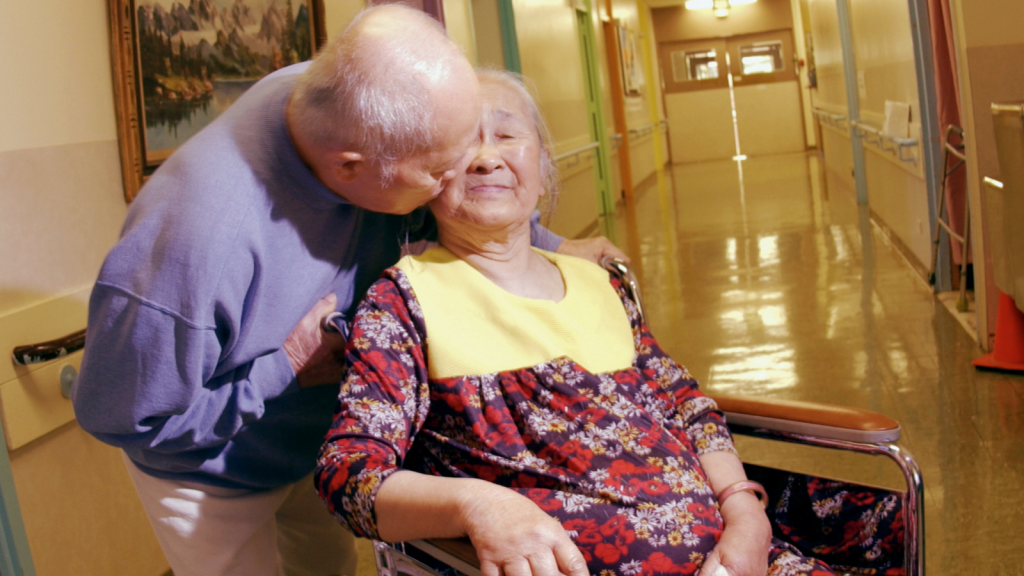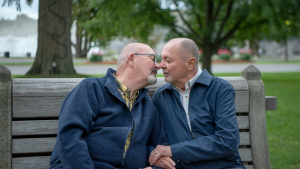
STIs Are Not Just for the Young
STIs aren’t about age, they’re about sexual behavior. Older people are having sex, and they need to be thinking about sexually transmitted infections.

By Fred Wyand
Sexual Intimacy: A Human Right.
That’s a bold statement. When I think of rights typically those of the civil/legal variety are what come to mind. A right to have sex, though? While it may not be enshrined in the Constitution, it does make sense that humans should be free to pursue what nature obviously intended us to do (and what the vast majority of us seem to enjoy doing).
So that declaration might not seem so bold after all. But what if it’s printed in large font type as the opening salvo on a document, issued by a retirement home, to affirm that not only is it okay for the senior citizens living there to be sexually active but that it’s natural, healthy, and desirable they do so?
In 1995 the Hebrew Home in Riverdale, New York, established what’s recognized as the nation’s first Sexual Expression policy for residents of a retirement community. Later updated to address matters of consent (which can be especially tricky with patients coping with Alzheimer’s disease and dementia), the policy affirms sexual intimacy as a human right and lays out guidelines for appropriate sexual expression in their community along with staff responsibilities in safe-guarding residents’ well-being.
This document remains revolutionary nearly 30 years after it first appeared. My goodness, old folks (sometimes really old) get to have sex? The knee-jerk reactions to the notion span the gamut from bemusement to embarrassment (to, let’s face it, disgust) but here’s the thing: aging populations want to have sex, enjoy it, and increasingly expect it.
ASHA convened a meeting to discuss sexual health issues among an aging population and the experts in attendance agreed on these points:
Again, this makes sense, no? If it feels dang good at 25 to have a sweetie with whom we smooch, cuddle, spend quality time, and from whom we derive sexual delight, why would that not hold true as we age?
I asked Robin Dessel, an Alzheimer’s and Sexual Rights Educator with the Hebrew Home who worked on the updated policy, about the challenges for determining consent among elderly residents, especially when a number of whom have diminished mental capacities. She said the first lesson is not to assume an absence of ability to make choices in sexual partnership: “A diagnosis of dementia does not presume someone’s ability or lack thereof to have a sexual partner. Almost as if people default to say ‘this couldn’t be legitimate because one has dementia,’ and I’ll tell you that’s not correct.”
In terms of how staff works to assess and monitor consent, Dessel said it’s important to look beyond language: “With dementia so much of what we have to glean from people is nonverbal, as language skills are among the first to be compromised. Just because they can’t verbally express choices doesn’t mean they can’t indicate them, so it’s up to us to determine that. They may have memory loss, but have to work in their world to uphold their rights and choices. have to be upheld.”
The Hebrew Home’s policy addresses sexually transmitted infections (STIs) and Ms. Dessel says that while it hasn’t come up, the Home would insist on safer sex practices with a resident diagnosed with an STI. Given that STIs are common across all age groups—with rates rising among seniors—this seems an especially fertile area to address. Surveys indicate those in older age groups are less likely to wear condoms; are less knowledgeable about safe sex practices and the implications (e.g., STIs and HIV). For many seniors, the sexual horror scenario of their youth was unintended pregnancy, not that they might get the clap while doing so. Clearly sex ed should be part of life-long learning.
We shouldn’t overlook the mechanics of sex, which can surely get a bit creaky as we age. This was also a major discussion point that emerged during our meeting—the idea that sexual health issues for seniors exist across the spectrum, including medical matters like erectile dysfunction, vaginal dryness but also other conditions that, while not directly sexual in nature, can still impact one’s ability to romp in Cupid’s garden.
A key to address those challenges is that both providers and patients should be empowered to talk about sexual health. Educating consumers to feel comfortable in starting the conversation is important. We talked at length during our meeting on the need to actually model these conversations: for example, a video for provider depicting a doctor or nurse discussing sexual health with a patient. On the flip side, a sexual health tip sheet for patients might be just the thing to take to their next clinic visit.
The Hebrew Home’s policy tells me we need to expand this scope to include staff/administrators in retirement homes and other professionals working with older adults. Since they interact with residents and determine issues of privacy and consent, both residents and staff should feel as comfortable as possible in discussing these matters.
You live long enough, you get old. It’s nice to know that acceptance and encouragement of sex as we age is increasing.

STIs aren’t about age, they’re about sexual behavior. Older people are having sex, and they need to be thinking about sexually transmitted infections.

In this essay, certified sexuality counselor Evelyn Resh reflects on how our sex lives and perceptions of pleasure change over time.

What exactly does sexual health mean when applied to those of us who are considered boomers? It’s about more than just going to the doctor – sexual health awareness is about taking care of your own sexual well-being as well as working to promote a

Sex can be part of life well into our later years. While we may face health challenges as we age, we can still continue to enjoy a satisfying sex life.

This essay from Dr. Pepper Schwartz, featured in ASHA’s book Creating a Sexually Healthy Nation, gives the scoop on Baby Boomers and navigating the sexual landscape as they age.
ASHA believes that all people have the right to the information and services that will help them to have optimum sexual health. We envision a time when stigma is no longer associated with sexual health and our nation is united in its belief that sexuality is a normal, healthy, and positive aspect of human life.
ABOUT
GET INVOLVED
ASHA WEBSITES
GET HELP
© 2025 American Sexual Health Association